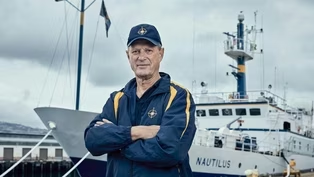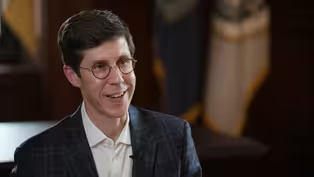
My Take: End of Life Care
Clip: Season 4 Episode 18 | 5m 31sVideo has Closed Captions
An end-of-life doula gives her a take on dying well.
Bonnie Evans is an end-of-life doula, also known as a death doula. While most people avoid conversations about death, she takes another view: that talking about and preparing for death is essential. Part of our continuing series, My Take.
Problems playing video? | Closed Captioning Feedback
Problems playing video? | Closed Captioning Feedback
Rhode Island PBS Weekly is a local public television program presented by Ocean State Media

My Take: End of Life Care
Clip: Season 4 Episode 18 | 5m 31sVideo has Closed Captions
Bonnie Evans is an end-of-life doula, also known as a death doula. While most people avoid conversations about death, she takes another view: that talking about and preparing for death is essential. Part of our continuing series, My Take.
Problems playing video? | Closed Captioning Feedback
How to Watch Rhode Island PBS Weekly
Rhode Island PBS Weekly is available to stream on pbs.org and the free PBS App, available on iPhone, Apple TV, Android TV, Android smartphones, Amazon Fire TV, Amazon Fire Tablet, Roku, Samsung Smart TV, and Vizio.
Providing Support for PBS.org
Learn Moreabout PBS online sponsorship- There's a quote by Woody Allen that I think speaks to this.
His quote is, "I'm not afraid of dying, I just don't wanna be there when it happens."
(Bonnie claps) My name is Bonnie Evans and this is my take on end of life.
In my career, I really have focused in palliative and hospice and end of life care for the past 25 years in the role of a nurse practitioner then transitioning into the role of an end of life doula in the last three years.
An end of life doula could help with advanced care planning or maybe sitting vigil at the bedside when somebody's close to end of life.
Or they could help with grief support just practical support for the caregiver.
When my father was dying of cancer his symptoms were not well managed.
We really didn't talk about what was happening to him and only found out after he died how much he was suffering with his end of life.
Looking back, I think we could have done it better and that there was unnecessary suffering because we were sort of struggling in terms of how to take care of him.
And we need to do better.
And that's a major motivation for the work that I do.
I've seen what can happen when people don't know their options, when they don't know what questions to ask.
I wanted to reach out to my own community and have been able to contribute to a column called Life and Death.
And it's in the Bristol Phoenix newspaper.
I think if I were to explain sometimes what it's like to be there when someone is actually dying, it feels like a very sacred place similar to what it feels like when a baby is born.
And then there are times where I've been at the bedside and you can see that this person is comfortable, that they're ready, that the family is okay and comfortable at the bedside.
It's what people wish for, but it doesn't always happen.
And when it does happen, it's just a beautiful, beautiful thing.
I had an experience once where the client that I was visiting was very uncomfortable with having me come out to see him.
And the wife clearly looked like she needed all the support she could get.
So I ended up, during this visit, sitting next to his bed and in the conversation I could tell that he was wrestling with the decision about continuing to get treatment or what he really wanted to do was stay home.
Often when I'm talking to clients we tend to focus in general on some of the negatives.
And I like to ask the question what brings a smile to your face?
What brings you joy?
And that can often be an important, the answer to that can sometimes be very important to help you understand that person.
And when I asked him, what brings a smile to your face?
At first he couldn't answer.
And then as I was leaving and he called me back into the bedroom and he said, "I want you to see this."
And he went over to his laptop and he opened up and it was Pavarotti singing "Nessun Dorma".
♪ Nessun dorma ♪ ♪ Nessun dorma ♪ (crow cheering) - And he stood there weeping.
And it was just a moment I'll never forget.
Yeah, I knew I'd lose it.
(singing "Nessun Dorma") When someone's approaching end of life I see their focus narrow as, as the days are numbered.
I don't hear people saying I wish I spent more time at work.
I wish I had made more money.
It's about the love and the people in their life and that's what really matters.
And you know, sometimes all of us need that reminding.
(Bonnie claps) My name is Bonnie Evans and this was my take on end of life.
Video has Closed Captions
Clip: S4 Ep18 | 10m 24s | Oceanographer, Bob Ballard, on finding the Titanic and the search for Amelia Earhart. (10m 24s)
Video has Closed Captions
Clip: S4 Ep18 | 9m 17s | Providence Mayor, Brett Smiley’s first 100 days. (9m 17s)
Providing Support for PBS.org
Learn Moreabout PBS online sponsorship
- News and Public Affairs

Top journalists deliver compelling original analysis of the hour's headlines.

- News and Public Affairs

FRONTLINE is investigative journalism that questions, explains and changes our world.












Support for PBS provided by:
Rhode Island PBS Weekly is a local public television program presented by Ocean State Media

